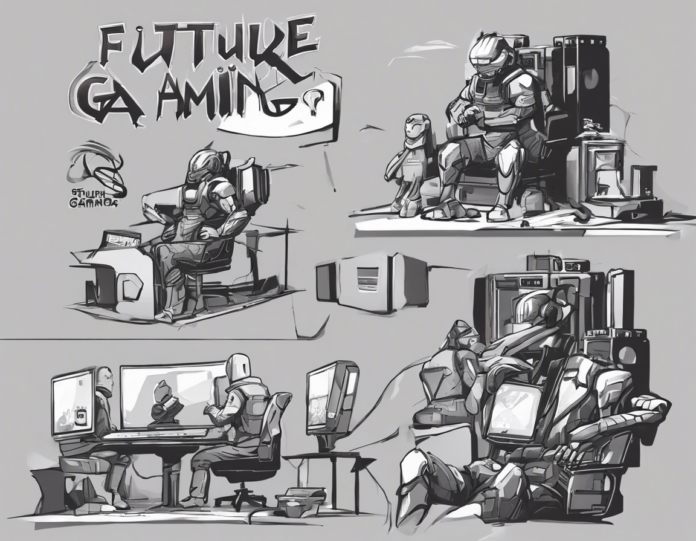In recent years, the gaming industry has seen exponential growth, with advancements in technology pushing the boundaries of what was once thought possible. From virtual reality to cloud gaming, the future of gaming is set to be even more immersive, interactive, and accessible than ever before.
Immersive Virtual Reality Experiences
Virtual Reality (VR) has been a game-changer in the gaming industry, offering players a truly immersive experience like never before. With the development of more advanced VR headsets and peripherals, players can expect to be fully immersed in their gaming worlds, feeling like they are actually inside the game. This level of immersion opens up endless possibilities for game developers to create new and innovative gaming experiences.
Augmented Reality Integration
Augmented Reality (AR) is another technology that is shaping the future of gaming. By overlaying digital content onto the real world, AR games blend the virtual and physical worlds seamlessly. Games like Pokemon Go have already showcased the potential of AR gaming, and as the technology continues to evolve, we can expect to see even more creative uses of AR in gaming.
Cloud Gaming Revolution
One of the most significant developments in the gaming industry is cloud gaming. With cloud gaming services, players can stream games directly to their devices without the need for high-end hardware. This opens up gaming to a wider audience, making high-quality gaming accessible to anyone with a stable internet connection. As internet speeds continue to increase and the technology behind cloud gaming improves, we can expect to see even more players embracing this new way of gaming.
Artificial Intelligence in Game Development
Artificial Intelligence (AI) is poised to revolutionize game development in the coming years. AI algorithms can be used to create more realistic non-player characters (NPCs), adapt gameplay to individual players, and even generate entire game worlds. This level of AI integration will lead to more dynamic and personalized gaming experiences, making each playthrough unique to the individual player.
Cross-Platform Play and Social Gaming
Cross-platform play has become increasingly popular in recent years, allowing players on different devices to play together seamlessly. This trend is likely to continue in the future, with more games supporting cross-platform play to bring players together regardless of the device they are using. Social gaming, where players can connect, compete, and collaborate with friends and strangers alike, will also play a significant role in the future of gaming.
Sustainability and Eco-Friendly Gaming Practices
As the gaming industry continues to grow, so too does its impact on the environment. In response to this, many game developers are shifting towards more sustainable and eco-friendly practices. From reducing carbon emissions to minimizing electronic waste, game developers are taking steps to ensure that gaming can be enjoyed responsibly for years to come.
The Rise of Indie Games
Indie games, developed by smaller studios or individuals, have been gaining popularity in recent years. These games often focus on creativity, innovation, and storytelling, offering unique experiences that stand out in a crowded market. As technology becomes more accessible, we can expect to see even more indie games making waves in the gaming industry, challenging the status quo and pushing the boundaries of what games can be.
Conclusion
The future of gaming is bright, with technological advancements and creative innovations driving the industry forward. From immersive VR experiences to sustainable gaming practices, the gaming landscape is constantly evolving to provide players with new and exciting experiences. As we look ahead, it’s clear that the possibilities are endless, and gaming will continue to be a source of entertainment, social interaction, and creativity for years to come.
Frequently Asked Questions (FAQs)
- What is the future of gaming?
-
The future of gaming is expected to be more immersive, interactive, and accessible, with advancements in technology like VR, AR, cloud gaming, and AI shaping the industry.
-
How will virtual reality change gaming?
-
Virtual reality will offer players a fully immersive experience, making them feel like they are inside the game world. This level of immersion opens up endless possibilities for game developers.
-
What is cloud gaming, and how does it work?
-
Cloud gaming is a service that allows players to stream games directly to their devices over the internet, eliminating the need for high-end hardware. Players can access high-quality games with just a stable internet connection.
-
Why is sustainability important in gaming?
-
Sustainability is crucial in gaming to minimize the industry’s impact on the environment. By adopting eco-friendly practices, game developers can ensure that gaming can be enjoyed responsibly for years to come.
-
How does AI impact game development?
-
AI can be used to create more realistic NPCs, adapt gameplay to individual players, and even generate entire game worlds. This level of AI integration leads to more dynamic and personalized gaming experiences.
-
What are indie games, and why are they becoming popular?
- Indie games are developed by smaller studios or individuals and often focus on creativity, innovation, and storytelling. They have been gaining popularity due to their unique experiences and the creative freedom they offer developers.
















